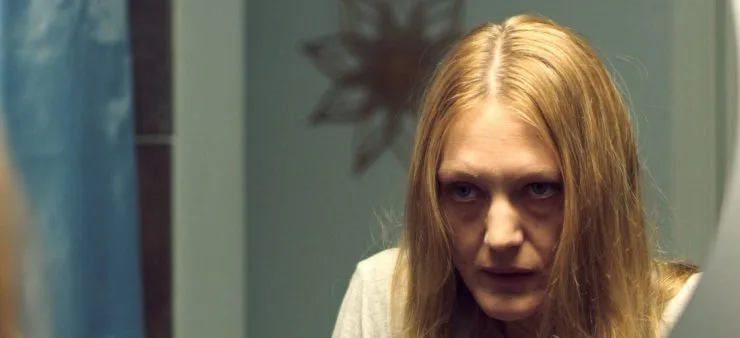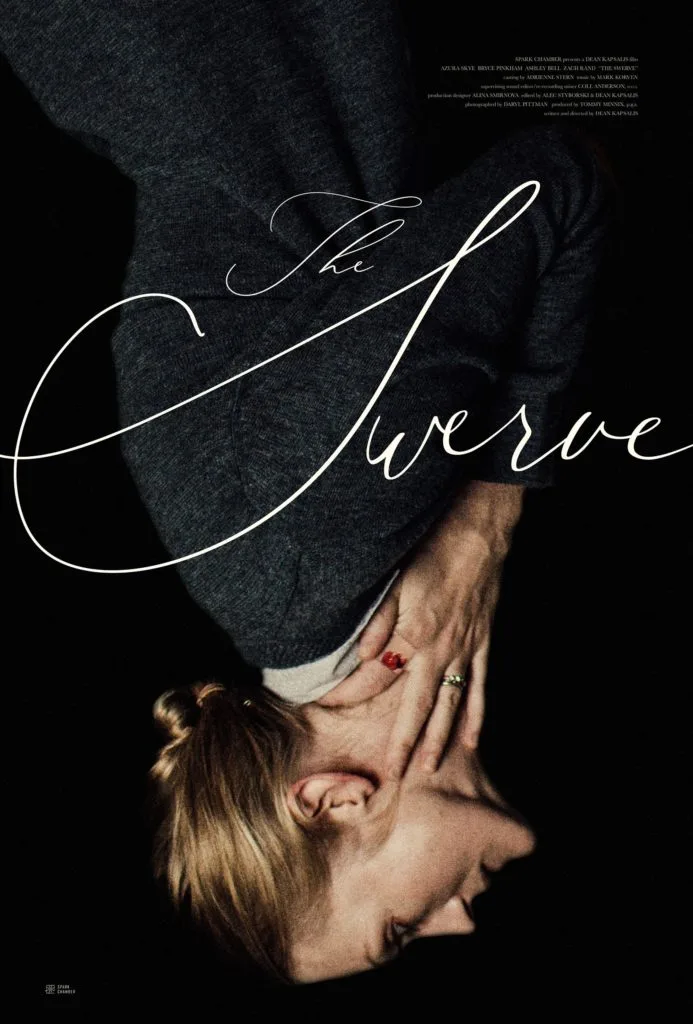
Insomnia – hand in hand with its best friend, anxiety – is a bizarre experience. A fundamental inability to do the most basic, fundamental thing your body requires; like the snake which eats its own tail, the complex brain which requires rest and recuperation is the very thing which prevents that, via its own complex functions, its exhausting neuroses, its endless alliances with doubt. Dreams, if and when they come, make you afraid of being asleep – or unsure if you are asleep at all. Insomnia and anxiety underpin The Swerve (2018) throughout – but it’s by no means the only neurosis, the only anxiety wreaking its quiet havoc here.
Holly (Azura Skye) is a married woman with two all-but-grown sons. Her life is predicated on looking after them, and she does so from a barely-there supporting role – cook, launderer, general servant – her smile and demeanour all strained, weak jollity. When not kept busy with all of this, she teaches English at a local high school: perhaps she gets a little more regard from her students, with one in particular, a boy named Paul (Zach Rand) taking an interest in her, but it doesn’t seem enough to redeem the rest of her support-role life.
Her equilibrium is further disturbed when, one morning, she sees a mouse in her kitchen: fixated on getting rid of it, she begins seeing it in other rooms of the house. It even bites her – she thinks – when she tries to retrieve something in the bedroom. Husband Rob (Bryce Pinkham) gets quickly exasperated by her fixation on it, and life has to go on: they are due to visit Holly’s parents where they encounter her smiling, passive-aggressive sister Claudia (Ashley Bell) for the first time in a while. Things spiral further; Holly begins to make attempts to reclaim some personal agency, leaving the family gathering to drive home alone, but it’s immediately wed to a troubling fantasy that she has cut someone up on the road and caused a fatal accident. From here, fantasy and delusion bleed into a barely less-gruelling reality; it’s an agony to watch, but it’s a quiet, domestic, understated agony.
The Swerve is one of those films that you find yourself revisiting in your mind, thinking over key scenes and developments and re-evaluating them. Did that really play out that way? Did this really happen? And of course, looking back at it overall it’s difficult not to see it as anything other than a tragedy. It’s more Miller than Medea – though you can certainly chart the overlap – but as this narrative progresses, it’s pure modern tragedy, fatal flaw, anagnorisis and all. Being set in the modern age, and shining a light on the suffering of a very ordinary, everyday woman, it lingers over the domestic. Shopping, cooking, cleaning – these get long, almost languid scenes in a way which belies Holly’s fraught energy. The editing shifts and becomes quick as her mind begins to unravel; the film takes on the feel of a fever dream, uncomfortably close to the feeling of sleep deprivation.

Holly is equally uncomfortable to watch; she looks genuinely nervy, exhausted and deeply hurt at being so ignored. No one thanks her, for anything. The contrast established between the rosy-cheeked, smiling toddlers who now exist only in picture frames and the sullen, rude and entitled teenagers who barely look at her marks out the divide between the ideal of family life and the reality, as I’m sure it genuinely feels for many people: this film affords me Babadook-levels of gratitude for not having children. The one person who seems to actually look at Holly and appreciate her, albeit on a warped level which is itself potentially harmful, she’d really benefit from avoiding. It’s a sad, complex situation, and I really wanted some vindication for Holly, despite her flaws. Watching what happens here is relentless. The only way forward for her seems to be to regress, but even that causes her more harm. It reminded me in some aspects of Dans Ma Peau (2002) – a woman shrinking from real life, devalued by her partner, going through the motions. This is the horror is of an intelligent woman who finds herself confronted with the reality of belonging to a servant class, only having the nous and sensitivity to, finally, see it as inescapable.
The Swerve is not an easy watch. It has few moments of light. It may have none, on reflection. But it is a triumph of telling a simple story in an extraordinarily sensitive way – a horror story with real, recognisable proportions. That this has been achieved in a first feature by a relatively inexperience writer/director? Remarkable.
The Swerve (2018) will be available on VOD/Digital on September 22, 2020.
